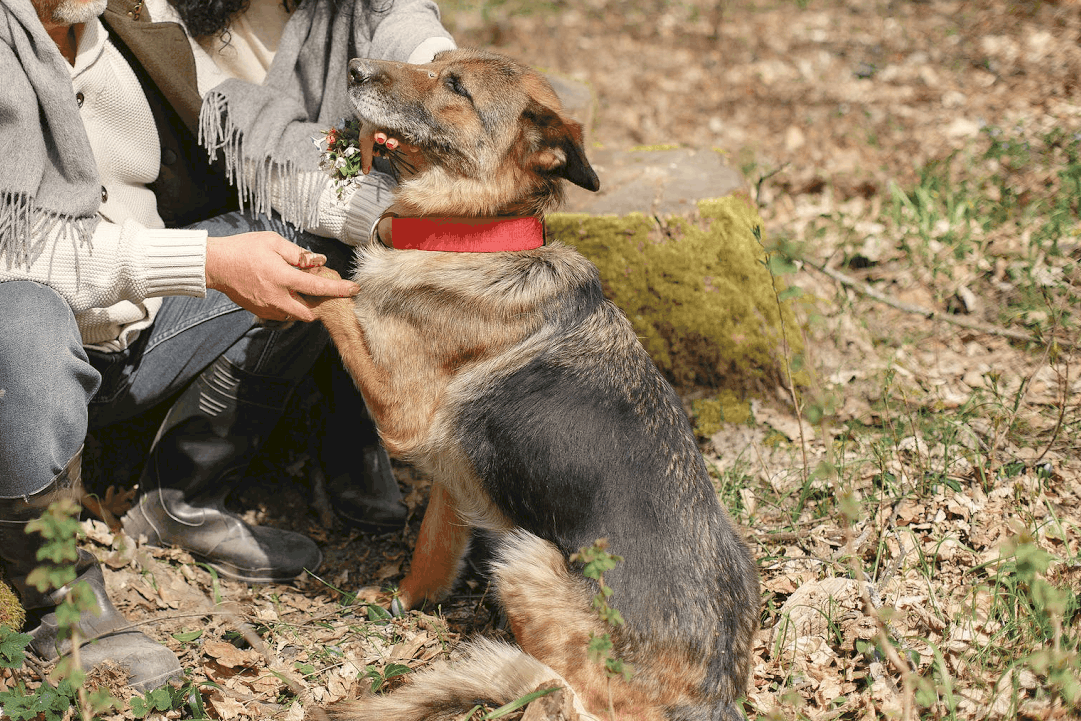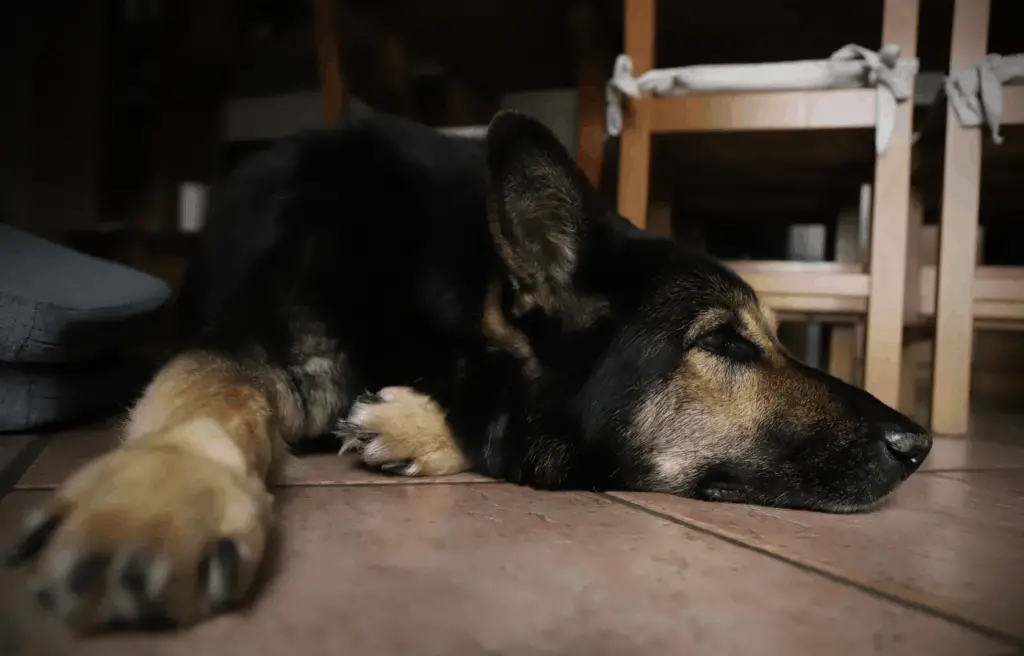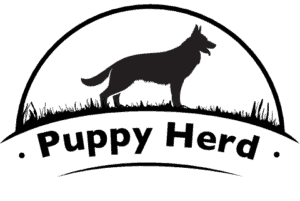Humans communicate with each other through speech and body language. Dogs, lacking the ability to talk, can only communicate with their owners through their actions and body language. German Shepherds are among the most common pet dog breeds kept in modern homes, and, like most dogs, they have developed their own way of relaying their emotions to their owners.
If your German Shepherd puts his paw on you, he is most likely trying to convey affection. Dogs may place a paw on you when you’re petting them in an attempt to pet you back, but if they are constantly pawing at you relentlessly, it may be a plea for attention or a way of demanding food.
For the most part, a dog that puts their paw on you is trying to show you that they love you. This article will examine where this practice originated, when pawing is not desirable, and what you can do to stop undesirable behavior.

Origin Of Pawing
The nature of a German Shepherd is to be loyal and devoted to their human family. This type of dog thrives on having someone that tells them what to do and enjoys the company of humans.
However, as they cannot speak, they have to communicate in other ways, and placing their paw on you or jumping up is a sure-fire way of getting your attention.
Generally, once a dog has placed their paw on you, you are likely to give it a scratch behind its ears, and therefore, they are likely to do it again. The baseline thought is that a German Shepherd would like to communicate when it places its paw on you, and the action is one of affection, possibly seeking affection in return.
The idea that a dog placing its paw on you is a negative attribute is untrue. If we trace dog ancestry back to wolves, we see that they used to place their paws on another wolf’s back or neck as an assertion of dominance.
This still holds true today, as a dog that places their paw on the neck or back of another dog is displaying dominant behavior.
However, this is not the same as when a dog places their paw on a human. The two actions have two completely different meanings as dogs communicate with other dogs in a completely different way than they communicate with humans. (Source)
Calling For Attention
If your German Shepherd places their paw on you, they are most likely trying to get your attention. This call for attention is linked to affection as the dog enjoys your company, likes you, and wants you to return the favor.
Most people subconsciously reinforce this behavior by touching the dog when the dog places its paw on them. They do this by scratching its ears or petting its head or body. The dog gets the attention it wants, so it is likely to repeat the action. (Source)
Indication Of Playfulness
A dog that raises their paw when in front of you and, in the same action, waves or places their paw on you is being friendly and playful.
This behavior is commonplace in German Shepherds as they are such high-energy dogs. They may raise their paw at you, wave their paw at you, and eventually put their paw on your physical body to get you to play with them (Source).
About German Shepherds
German Shepherds are incredibly loyal dogs that are very devoted to their human companions and will often lay their lives on the line for those that they love. It is not uncommon for German Shepherd owners to notice that their dogs are “pawing” at them with their noses.
This is because the German Shepherd is, by nature, a herding dog. They use their noses in their work and may well use their noses to “paw” at you instead of their actual paws, but the indication is the same — they are trying to show affection or playfulness. (Source)
When Pawing Is A Problem
A German Shepherd that places their paw on you or other humans isn’t a problem by and large. If the dog in question is only putting a paw on you once, and keeping it there as a sign of affection or an indication that the dog wants attention, it is perfectly normal and not harmful.
If you scratch their ears at this point, pet them in any way, or even speak to them, the behavior is reinforced. It is likely that they will do so again, especially in the case of German Shepherds, where a love of training and intelligence has been bred into them.
German Shepherds, being one of the smartest dog breeds, can also easily be taught a trick like raising a paw, placing a paw on a person, or even waving their paw in a “hello” or “goodbye” motion. Most of the time, a single paw on a person is absolutely no cause for concern.
Excessive Or Constant Pawing
Unfortunately, if your German Shepherd constantly or excessively paws at you or guests, it can become a problem. This is largely due to their size and their ability to accidentally hurt others, especially children if this behavior is not corrected.
If you are concerned about your dog’s pawing behavior, it is important to identify the source and cause of the behavior if you want to correct it. Look for the factors that lead to pawing and determine what the dog is hoping to achieve through the action.
Pawing For A Specific Purpose
German Shepherds are incredibly smart, and they will quickly learn that pawing gets your attention and thereby start pawing at you if they want something from you, like food.
For the most part, a dog that engages in a certain behavior to get fed is identified as having problematic behavior. Especially in large dogs, actions that demand food should be corrected as it can lead to dominance issues in the household, especially with a naturally dominant and large dog such as a German Shepherd.
If your German Shepherd has started pawing at you or guests if it wants food or a treat or to go for a walk, this behavior should be corrected.

Correcting Unwanted Pawing Behavior
Dogs that have learned to paw constantly, aggressively, or for food or walks have been reinforced in this behavior, and the behavior needs to be unlearned. Luckily, German Shepherds are intelligent and highly trainable, and correcting unwanted pawing behavior is not difficult to do.
Positive Reinforcement
Generally, dogs don’t respond well to punishment. They don’t understand that pawing is wrong as they have been reinforced in this behavior in the past, so they will not learn to stop pawing at you if you punish them for doing so. Instead, they may become fearful of you or a certain situation as a result.
The key to correcting any behavior lies in positive reinforcement. Reward the dog for being good instead of punishing it for being bad.
German Shepherds are excellent learners and will catch on quickly. If you want your dog to stop pawing at you, reward them when they stop. As soon as the dog stops pawing at you, reward them vocally and with a treat. (Source)
More importantly, if your dog does paw at you, ignore the behavior. Do not punish the dog. Do not yell at the dog. Do not touch the dog. Above all else, do not reward the dog by scratching its ears or giving in to its bidding. Instead, ignore the behavior until it stops or settles down, then immediately reward it.
Your German Shepherd will quickly learn that it does not get what it wants by pawing, but is rewarded when it stops.
Distraction
One of the best ways to stop your dog pawing at you is by giving them something else to do. Teach them to sit, “shake” instead of paw, or fetch a toy to play with. German Shepherds are natural students and will enjoy the mental stimulation and the reward that goes along with it.
The best distraction or opposite behavior is one that is contradictory to pawing, so teach the dog to sit or get them to perform an “all four on the floor” trick, where all four of their paws must touch the floor before they are rewarded. In doing so, they cannot paw and, therefore, the behavior is likely to stop.
Meet Their Needs
If you’ve noticed that your German Shepherd most often paws at you for food or walks, make sure that their needs are met before you sit down or settle down to something else. They will be less likely to paw at you, but, if they do, use distraction and positive reinforcement to correct the behavior.

Final Thoughts
Your German Shepherd is most likely placing its paw on you as a sign of affection and because it wants your attention at that point in time. Generally, this is not a problem, and most dog owners won’t see any issue with it.
However, if your dog is pawing relentlessly or aggressively or to get something that they want, the behavior can easily be corrected.
You can correct unwanted behavior through positive reinforcement, ensuring their needs are met so that they don’t feel obliged to demand attention, and through distraction training. German Shepherds are smart and highly trainable, so following the correct training procedures will help you achieve the desired results in record time.
